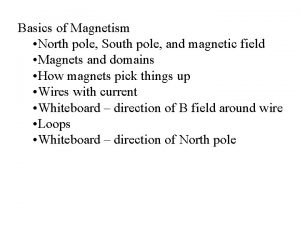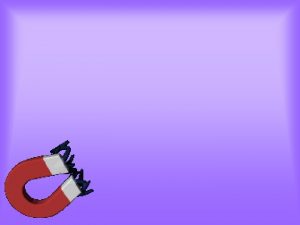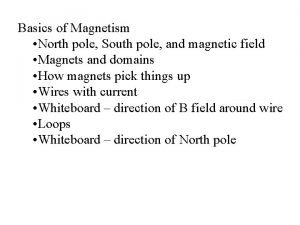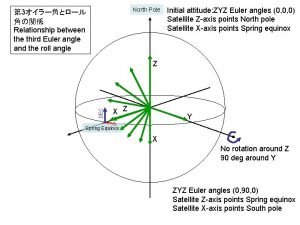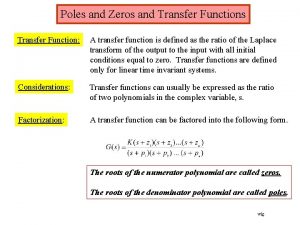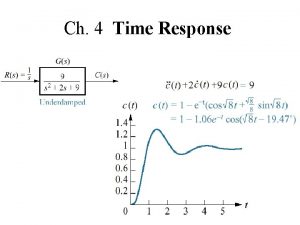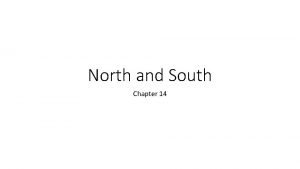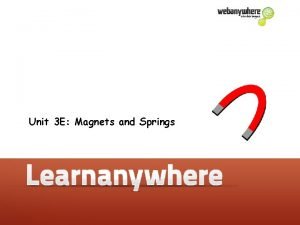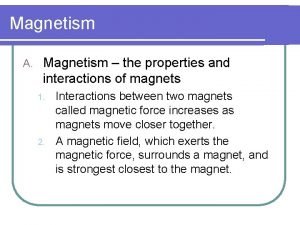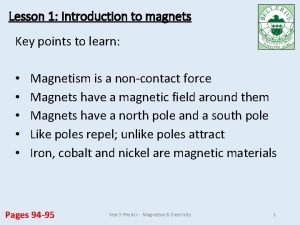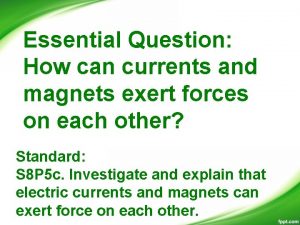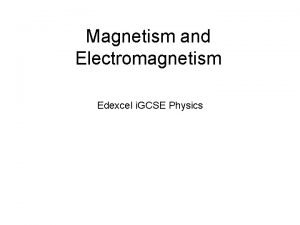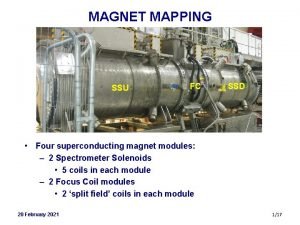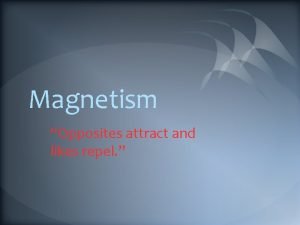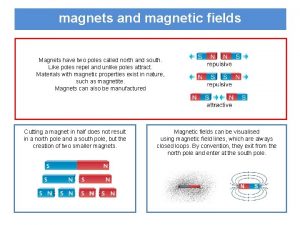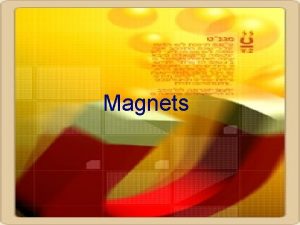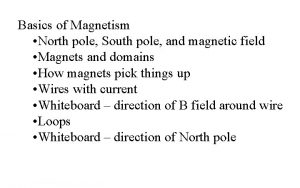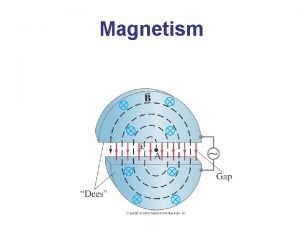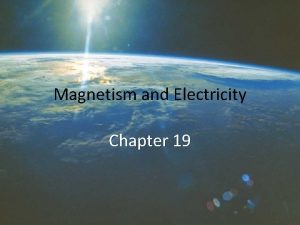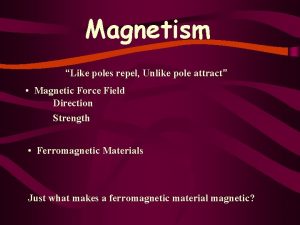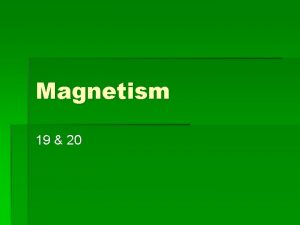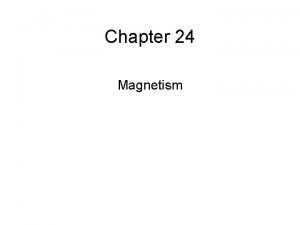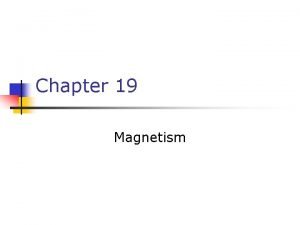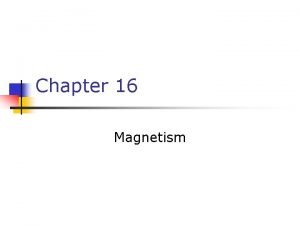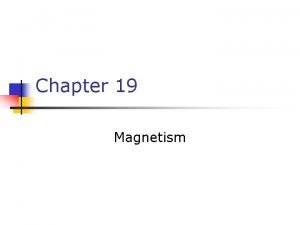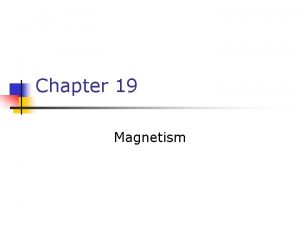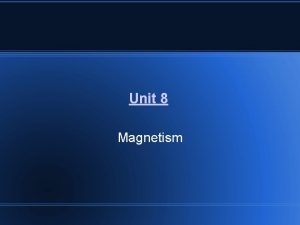Magnetism Magnets have 2 poles north pole and



















- Slides: 19

Magnetism Magnets have 2 poles – north pole and south pole. Like poles repel and unlike attract. Magnets occur naturally (loadstone) and can be created from iron nickel or cobalt. A current carrying wire has a magnetic field. A magnetic field is the area around a magnet where a magnetic force is felt. The direction of a magnetic field is that in which a north pole would move.

Plotting Magnetic Fields • Magnetic fields are plotted using compasses. Bar magnet Straight wire Right hand grip rule Solenoid Loop

The horseshoe magnet

The Earths Magnetic Field The angle between the geographic and magnetic north is called the magnetic declination or magnetic variation.

The Earths Magnetic Field • The earths magnetic field is used in navigation. • It also protect the earth from cosmic radiation.

Current in a magnetic field A current carrying wire will experience a force when placed in a magnetic field.

The Left Hand Rule • Index finger field • Middle finger current • Thumb force

Current in a magnetic field The force experienced, the current direction and the magnetic field direction are all perpendicular to each other. The left hand rule will predict direction. This is the principle behind loud speakers moving coil metres the electric motor,

The speaker Theloud Loudspeaker A current carrying wire experiences a force when placed in a magnetic field.

The Motor A current carrying wire experiences a force when placed in a magnetic field.

The moving coil meter A current carrying wire experiences a force when placed in a magnetic field.

To demonstrate the force experienced by a conductor when placed in a magnetic field. Place a piece of aluminium foil between the poles of a strong magnet. Pass current through the foil and it will move under the force experienced. Reverse the direction of the current and note that the foil moves in the opposite direction. Why is aluminium used?

The size of the force depends on: 1. The current (I) 2. The length of the conductor (L) 3. The magnetic flux density (B) F = BIL The magnetic flux density (B) is the force per unit current per unit length on a conductor at right angles to a magnetic field. The unit is the TESLA.

When the conductor makes a non right angle with the field. It is the component of B perpendicular to the conductor that causes the force. i. e. BSinϑ

The Ampere 1 Amp 1 m 2 x 10 -7 N/m

The Ampere is the current in 2 straight parallel conductors one metre apart in a vacuum that causes each to exert a force of 2 x 10 -7 N per metre length on the other. Tandem Felix

The Ampere Set up the circuit as shown. The foil strips are seen to move away from each other. This is the experiment on which the definition of the Ampere is based.

Force on a charge in a magnetic field • The force is perpendicular to the direction that the charge moves in and so the force causes the charge to move in a circular path. • This force is a centripetal force. • Circular motion equations apply.

Force on a charge in a magnetic field
 Define north pole and south pole
Define north pole and south pole The north pole ____ a latitude of 90 degrees north
The north pole ____ a latitude of 90 degrees north Wave armature winding
Wave armature winding Aimant pole nord pole sud
Aimant pole nord pole sud Why is magnetism an invisible force
Why is magnetism an invisible force North pole sun path
North pole sun path Current magnetic north pole
Current magnetic north pole Euler
Euler Bode plot simulink
Bode plot simulink This method is used for carrying victims moderate distance
This method is used for carrying victims moderate distance Zeros and poles
Zeros and poles North east and cumbria ics
North east and cumbria ics Chapter 14 lesson 1 the industrial north
Chapter 14 lesson 1 the industrial north Magnets and springs
Magnets and springs The properties and interactions of magnets
The properties and interactions of magnets Magnets and magnetic fields lesson 1 answer key
Magnets and magnetic fields lesson 1 answer key Explain how currents and magnets exert forces on each other
Explain how currents and magnets exert forces on each other Examples of electromagnets
Examples of electromagnets Ssd and magnets
Ssd and magnets Opposites attract and likes repel
Opposites attract and likes repel
